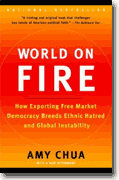Amy Chua
book reviews:
· general fiction
· chick lit/romance
· sci-fi/fantasy
· graphic novels
· nonfiction
· audio books
· author interviews
· children's books @
curledupkids.com
· DVD reviews @
curledupdvd.com
newsletter
win books
buy online
links
home
for authors
& publishers
for reviewers

 |
World on Fire: How Exporting Free Market Democracy Breeds Ethnic Hatred and Global Instability Amy Chua Anchor Paperback 368 pages January 2004 |
|
Amy Chua’s World on Fire comes at a time when democracy and economic reforms are being touted as the answer to the world’s political, economic and social problems - not just by the Western intelligentsia but also by international institutions. Chua points out some flaws in this thinking and shows that a great deal of strife and conflict in the third world is the result of the combination of democracy with the free market. The recent opening up of the third world economies has created affluent minorities, while the rise of democracies in the same countries has resulted in majority rule. This gives rise to an incompatible equation with disproportionate wealth in the hands of a minority and the rule of the impoverished majority. Substitute wealthy minority by wealthy ethnic minority and you have the recipe for ethnic strife and violence on your hands.
The Chinese ethnic minority stories do not end in Philippines. Across vast regions of Southeast Asia from Burma to Thailand, Malaysia, Indonesia and Vietnam, the Chinese, though minorities, are economically powerful and dominate business and commerce at every level of society. With the liberalization and economic reforms of the last decade, this group has accumulated immense wealth. In contrast, a large chunk of the indigenous majority live under conditions of extreme poverty. With democracy, this suppressed majority gets political power that may often result in ethnic revenge, as was seen in the late nineties with the hounding of the Chinese from Indonesia. It was the same story with the Indians in East Africa, Lebanese in West Africa, whites in South Africa and Latin America and Jews in post-Communist Russia. In each case, Chua shows that democracy and free markets did not go hand in hand; far from it, this volatile combination had disastrous consequences in several third-world societies. In most cases Chua has a valid point. But she is on shaky ground when she tries to stretch her theory to explain ethnic violence in general. Here she sounds no different from the school that touts the mantra of economic liberalization and democracy as the answer to all the world’s ills. For instance, the conflicts in the Middle East, central Asia and parts of Africa have little to do with the free market-democracy combo and more to do with local issues of the region, religious, political or economic. Toward the end of the book, the writer talks about how democracy in itself implying political empowerment of the majority is never sufficient if it cannot be stable and ensure grassroots development, growth of basic infrastructure, justice and dignity for all. While parts of Chua’s book may make the reader wonder about whether democracy is an effective option after all for the third world where the impoverished electorate has no real voice, one should not forget the words of the Nobel laureate economist Amartya Sen. Talking about democracy and third world politics, Professor Sen had once remarked “A country does not become fit for democracy; it becomes fit through democracy.” Perhaps then, free markets or no free markets, the real answer lies in democracy and democratization of political institutions of the third world. © 2004 by Shampa Chatterjee for curledup.com. |
|
|
|
 Click here to learn more about this month's sponsor! |
|
| fiction · sf/f · comic books · nonfiction · audio newsletter · free book contest · buy books online review index · links · · authors & publishers reviewers |
|
| site by ELBO Computing Resources, Inc. | |
 Chua, a Yale school law professor is no stranger to this problem. Growing up in a wealthy Chinese-Filipino family that owned conglomerates in the Philippines, Chua saw firsthand the extreme deprivation of the Filipino population juxtaposed with the wealth of the minority flourishing Chinese business community. She also saw ethnic hatred take on an extreme form when her wealthy aunt was murdered by the family chauffeur. The police in the Philippines, comprising primarily poor ethnic Filipinos were unmotivated to solve the case, and the file was soon closed.
Chua, a Yale school law professor is no stranger to this problem. Growing up in a wealthy Chinese-Filipino family that owned conglomerates in the Philippines, Chua saw firsthand the extreme deprivation of the Filipino population juxtaposed with the wealth of the minority flourishing Chinese business community. She also saw ethnic hatred take on an extreme form when her wealthy aunt was murdered by the family chauffeur. The police in the Philippines, comprising primarily poor ethnic Filipinos were unmotivated to solve the case, and the file was soon closed.